The Great Deceit
The Polish Legion in Haiti
For many people there is a fundamental difference between patriots who fight for noble ideals, and mercenaries who hire themselves out to exploiters and oppressors. While such a distinction does indeed occasionally exist, it should not be forgotten that newly defeated idealists and patriots have always formed a major reservoir for new mercenary armies. Countless Scots, Irishmen, Huguenots, and many others have offered their services in foreign lands after failed revolutions at home. Likewise, unscrupulous rulers have always tried to make use of suppressed religious and ethnic groups in other countries for hiring as cheap soldiers. In this manner Venice recruited in the Balkans over centuries, while Catholic France supported the Protestants against the Habsburgs and even mobilised Indian tribes in North America against England. Freedom fighters and revolutionaries often perform mercenary services without even being aware of it, and many of them become available on the mercenary market after defeat or while in exile. Certainly one of the most bitter jokes in history is that the very people who fought hardest for their liberty also proved to be an exceptionally large wellspring of mercenary forces.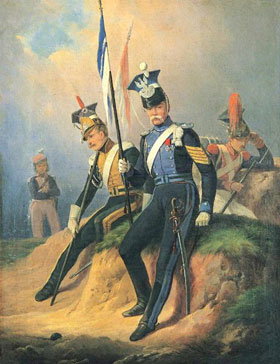 One such people are the Poles. After Prussia, Russia and Austria had divided up the
territory of the former major power of the 18th Century, the Poles tried in numerous
uprisings to reclaim their own nation. It goes without saying that other powers also
tried frequently to make use of this desire for freedom for their own benefits. Even
during World War II, the British used Polish troops as cannon-fodder at Monte Cassino,
when they had already sold off their country to Stalin. After the war, some Polish exiles
could still be found on the payroll of the CIA or as pilots in the Congo. However, it is
near the beginning of their history - so abundant in heroism, betrayal and deceit - that
we encounter the Polish Legions in the service of France.
One such people are the Poles. After Prussia, Russia and Austria had divided up the
territory of the former major power of the 18th Century, the Poles tried in numerous
uprisings to reclaim their own nation. It goes without saying that other powers also
tried frequently to make use of this desire for freedom for their own benefits. Even
during World War II, the British used Polish troops as cannon-fodder at Monte Cassino,
when they had already sold off their country to Stalin. After the war, some Polish exiles
could still be found on the payroll of the CIA or as pilots in the Congo. However, it is
near the beginning of their history - so abundant in heroism, betrayal and deceit - that
we encounter the Polish Legions in the service of France.
In 1795, when yet another great Polish insurrection had been quelled by Russia and Prussia, many Poles had to flee abroad. Most emigrated to France, which waged war not only for freedom in general, but also more specifically against Russia and Austria, both old arch-enemies of Poland. Since France had an almost insatiable demand for soldiers the Poles were highly welcome, and the French were of course more than forthcoming with promises that Poland would be rebuilt after the imminent victory. From more than 5,000 volunteers, a "Polish Legion" was formed, which soon proved its value in grueling battles against Austrians and Russians in Italy and Switzerland.
But the real policies of those in power, as so often, served other interests and used other means. For the conflict with his most stubborn opponent, Great Britain, Napoleon needed a compromise with Russia and Austria and here the wishes of the Poles were naturally in the way. Furthermore he aimed at absolute power in France and therefore had to get rid of the old revolutionaries, the Jacobins, who had many sympathisers among the Polish officers. While the incorrigible Jacobins were being deported to Cayenne, Napoleon found a special task for the Poles. The former freedom fighters would help to re-establish slavery in French Haiti.
Haiti, the western part of the former Spanish island of Hispaniola, was one of the most efficient slave colonies in the Caribbean, where a very small number of white plantation owners generated enormous riches. To maximize profits, the black slaves were exploited so harshly that they often perished after a few years of hunger and exhaustion, so that the plantations needed a constant stream of new slaves from Africa. Slave revolts happened frequently in almost all Caribbean plantation colonies but were normally crushed with the help of European troops.
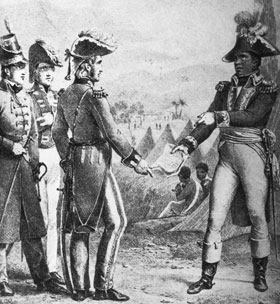 The great slave revolt in Haiti in 1792 would certainly have suffered the same fate had
European politicians not taken an interest in the cause of the slaves. Since France was
at war with Spain and England, the insurgents fighting against French rule could withdraw
to Santo Domingo - the eastern, Spanish part of the island - where they were supplied
with weapons from England. In the ensuing colonial war the former rebels slowly evolved
into an important force which was courted by all sides. The leader of the slaves,
Francois Toussaint Louverture, was even promoted to brigadier general by the Spaniards.
The French, in their desperation, weren't stingy with offers either. They promised a
general amnesty and freedom for any slave after five years of military service.
The great slave revolt in Haiti in 1792 would certainly have suffered the same fate had
European politicians not taken an interest in the cause of the slaves. Since France was
at war with Spain and England, the insurgents fighting against French rule could withdraw
to Santo Domingo - the eastern, Spanish part of the island - where they were supplied
with weapons from England. In the ensuing colonial war the former rebels slowly evolved
into an important force which was courted by all sides. The leader of the slaves,
Francois Toussaint Louverture, was even promoted to brigadier general by the Spaniards.
The French, in their desperation, weren't stingy with offers either. They promised a
general amnesty and freedom for any slave after five years of military service.
When Toussaint Louverture, who by now commanded a strong and relatively well-armed force, noticed that the Spaniards had no intention of abolishing slavery and the British even reinstalled it in the territories they controlled, he changed sides to the French. After Spain had ceded the island to France in the Peace of Basel and Great Britain had withdrawn her troops, Toussaint Louverture subjugated the different rival rebel groups and by 1800 controlled the entire island. He gave the country a constitution which stipulated the equality of races and its affiliation to France.
With this, Napoleon should have been satisfied. However, since his primary aim was to restore the French Empire to new splendour, he was outraged at having to accept conditions from a former slave. Moreover, the rich planters found in his wife Josephine - a Creole from Martinique - a strong supporter. So he chose to restore the old order with a military intervention. As chief of the expeditionary force he appointed his brother-in-law Leclerc, whose wife constantly caused new scandals at court in Paris. Along with these problematic kinfolk went particularly unreliable and troublesome troops - foreign battalions and old Jacobins. It wasn't the first time in history that a colonial war became a kind of dumping ground for internal policy. In addition, the great general gave his brother-in-law some instructions how the war could be won quickly: 1: Promise everything; 2: Launch a surprise strike; 3: Arrest the leaders; 4: Reinstate slavery.
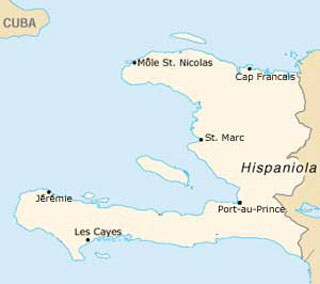 Leclerc arrived in Haiti in January 1802 with 14,000 men. The resistance on the coast was
quickly broken and the French conquered Cap Francais, Port-au-Prince and all the other
major towns. The rebels defended themselves bravely, but soon the first officers changed
sides with their troops to the French because they were guaranteed their ranks. Toussaint
Louverture was arrested during negotiations and deported to France where he soon died in
the castle of Joux in the cold French Jura. After the war seemed won, Leclerc reinstalled
slavery as he was ordered by Napoleon. Soon the first planters returned from abroad and
the export of sugar rose again.
Leclerc arrived in Haiti in January 1802 with 14,000 men. The resistance on the coast was
quickly broken and the French conquered Cap Francais, Port-au-Prince and all the other
major towns. The rebels defended themselves bravely, but soon the first officers changed
sides with their troops to the French because they were guaranteed their ranks. Toussaint
Louverture was arrested during negotiations and deported to France where he soon died in
the castle of Joux in the cold French Jura. After the war seemed won, Leclerc reinstalled
slavery as he was ordered by Napoleon. Soon the first planters returned from abroad and
the export of sugar rose again.
The resistance in the mountains, however, where many blacks had withdrawn, endured. They received help from British and American arms dealers (the Americans dealt with both sides) and obtained a steady inflow of fugitive slaves. But the major enemy of the French was the yellow fever. Normally, the death rate was 15% with unacclimated troops, but it rose as high as 80%. In the summer of 1802 an average of 100 men died every day. Under these circumstances, the insurgents were getting stronger and were soon in operation near Le Cap. The French reacted with ever more brutal repressions: prisoners and alleged rebels were hanged, shot or drowned in groups at sea. The rebels responded with similar methods; whites were chopped into pieces, slow-roasted or sawn in half. Leclerc's most important ally proved to be the black General Dessalines, who did most of the dirty work for the French and was therfore praised by Leclerc in a letter to Napoleon as "Butcher of the Blacks".
Replacements from France arrived infrequently but were not enough to replenish the dwindling forces. As Leclerc's cries for help became louder and louder, Napoleon decided to send the third Polish half-brigade. After the Peace of Amiens they were stationed in Italy where their discontent grew. The former elite unit had become a political burden and had received no pay for months. Among the rank and file there were desertions while the officers harassed the French authorities with petitions. But there were no protests when the unit in Livorno was crammed into old transport vessels and shipped to Haiti. Many were without doubt glad to escape the boredom of garrison service, the officers were hoping for promotion, and all had been promised their pay.
The exotic dreams of many Poles were probably even exceeded by the reality of what they encountered upon their arrival in September 1802. Haiti presented itself as a tropical paradise with magnificent scenery and beautiful women; alcohol and good food were incredibly cheap, and there was plenty of tobacco. Soon, however, the complaints began. The Poles suffered terribly from the heat, and many got sick because they drank cold water in the mountains or ate too much unripe fruit. Furthermore there were myriad insects and parasites. The biggest problem however was that the Poles were completely unfit for guerrilla warfare. On the battlefields of Europe they had, as line infantry, withstood fierce enemy fire in solid formation and had charged in column with bayonets. The warfare in Haiti by contrast required dispersed formations and relied on the actions of small independent groups. The solid formations of the Polish proved not only to be totally inflexible, but also provided excellent targets for snipers.
The first Battalion was deployed in the north of Cap Francais. There, the soldiers marched aimlessly through the mountains, occupied blockhouses and redoubts, only to vacate them a little later. They suffered casualties in ambushes without even seeing their adversaries. The situation changed only when two black generals with their troops changed sides to the rebels and Cap Francais itself was threatened. In the hard fighting for the city the Poles proved their worth for the first time, fighting bravely to ensure the city could be held.
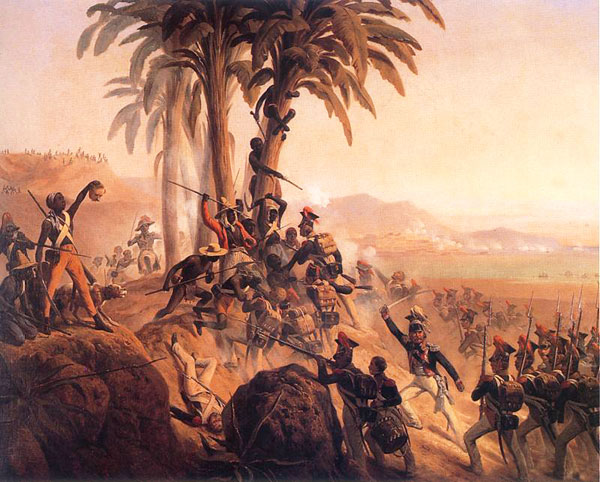
After this success, the French high command decided on a counter-offensive. The centre was formed by two colonial battalions of former slaves, while a Polish and a French battalion covered the flanks. However, when they encountered the enemy the two colonial battalions switched sides, forcing the French battalion and part of the Polish to withdraw. The remaining Poles, however, were cut off and had to barricade themselves in a building on a plantation. There they were burned to death after their ammunition ran out. Those who managed to escape were so decimated by yellow fever by the time they made their way to Le Cap that by the end of the year there were only about 100 men left. The third Battalion, which was deployed slightly further west in the region of Plaisance suffered a similar fate. When in October the colonial troops under General Dessalines went over to the enemy en masse, many small groups of the third Battalion were totally isolated in the countryside. Few were able to fend for themselves and a good number surrendered to the enemy.
After the defection of Dessalines, the remaining black troops were disarmed and killed for the most part. For this task the second Battalion, which had been moved to Saint Marc in the south, was used. There a battalion of 400 blacks was disarmed: mustered without weapons, they were then surrounded by French troops and on command massacred with bayonets. Some begged their white comrades in arms for mercy, others tried to flee into houses; both proved useless, and all were finished off without compassion. The roads must have been littered with corpses for days. Some Polish historians have spared no effort to prove that the Poles were not involved in this massacre, or that they had heroically rejected the command. The sources, however, indicate quite clearly that the Poles played a significant role, even though they weren't the only ones and probably carried out their task with reluctance.
But there was worse to come. In early November 1802 Leclerc died of yellow fever. His successor, General Viscount Donatien Rochambeau, was a corrupt racist of the worst kind who had long held the opinion that Leclerc lacked the necessary harshness. In addition he profitted personally from whites, to whom he sold passports so they could leave the colony, or imposed tributes, which then went largely into his coffers. In the war against the rebels, he turned out to be cruel sadist. His main weapons were terror and mass murder. He ordered prisoners to be burned alive, drowned in sacks, hanged, crucified or gassed in large groups with sulfur fumes. His favorite method was to have them torn apart by large dogs he had imported in great numbers specially from Cuba. The first shipment of dogs was celebrated with a big show in an arena where the dogs mauled some slaves in front of a large audience.
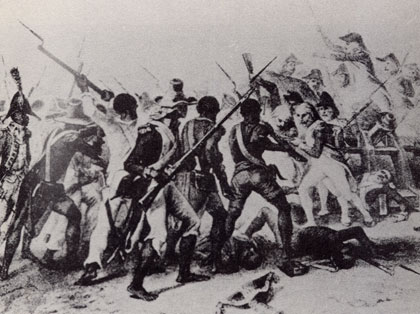 The army, however, had shrunken considerably: 4,000 had been killed, 16,000 had died of
yellow fever, and of the remaining 10,000 two-thirds were in hospital. Nevertheless
Rochambeau intensified the conflict. Land ownership for blacks was generally prohibited,
as was using them as soldiers. With brutal measures against the mulattoes, many of whose
soldiers he drowned, Rochambeau succeded in driving many new recruits into the arms of
the insurgents. Appropriately, his opponent was the butcher Dessalines, who at first was
hated by many blacks, because they still remembered him as a French general. But under
the pressure of Rochambeau's repressions he came out in 1803 as sole commander by
mercilessly killing all competitors and subduing all opposition. His calls for a pitiless
fight to the bitter end fell on an increasing number of receptive ears.
The army, however, had shrunken considerably: 4,000 had been killed, 16,000 had died of
yellow fever, and of the remaining 10,000 two-thirds were in hospital. Nevertheless
Rochambeau intensified the conflict. Land ownership for blacks was generally prohibited,
as was using them as soldiers. With brutal measures against the mulattoes, many of whose
soldiers he drowned, Rochambeau succeded in driving many new recruits into the arms of
the insurgents. Appropriately, his opponent was the butcher Dessalines, who at first was
hated by many blacks, because they still remembered him as a French general. But under
the pressure of Rochambeau's repressions he came out in 1803 as sole commander by
mercilessly killing all competitors and subduing all opposition. His calls for a pitiless
fight to the bitter end fell on an increasing number of receptive ears.
The Poles by this time were reduced to, at best, a few hundred men and these were transferred to other units. Among the French officers they had a bad reputation because they were not fit for jungle warfare. Completely demotivated, it was said that they tended to surrender in perilous situations. This was supported by the rebels, who now often encouraged the Poles to defect and spared them as prisoners. From these prisoners they heard of the sad history of Poland and therefore had developed some sympathies for them. However, German and Swiss soldiers were also often spared. Obviously, the former slaves saw certain parallels between the miserable fate of foreign mercenaries and their own. Their hatred was directed against the French, especially the white militias, who were the most racist. Most mercenaries by contrast lacked both the racial arrogance of the native whites and also their desire for revenge. Many even came from the lower classes, had been sold off by their sovreigns, had black women and liked to fraternise with the common people.
It was decided in France, at Rochambeau's insistence, to send another auxiliary corps of 12,000 men, including the second Polish half-brigade. By this stage enough was known about the situation in Haiti for there to be no doubt that the most soldiers were being sent to certain death. Consequently the mood among the corps was bleak and desertions became more frequent. After a promise was issued to pay arrears and offer better conditions, 2,500 men were finally mustered in Genoa. Among the officers the mood was better, which underscored the differences between them and the rank and file. Many volunteered because they had been put on half-pay or were entirely without money. As emigrants they were leading a miserable life, and had often accumulated significant debts. Only two took their leave, and were replaced without a problem.
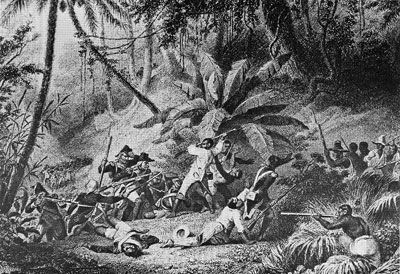 The auxiliary corps arrived just in time for Rochambeau's spring offensive in the south,
which was to be conducted by three columns against enemy bases on the southwestern
peninsula. But even at this stage it was clear that nobody had learned anything from
prior experiences. The newcomers were totally unable to adapt to their new circumstances
and faltered in the difficult terrain. When, for example, a column marched through a
narrow valley which was blocked by a barricade of felled trees, the Polish infantry
attacked in solid formation with fixed bayonets, and received heavy fire not only from
the front but also from both flanks. To penetrate the jungle on the flanks they would
have needed machetes which they didn't have, and furthermore they weren't really used to
such manoeuvers. So they were forced to retreat after suffering heavy losses. Since
nobody thought of moving the troops by sea, they dragged their guns under unspeakable
hardships over mountain paths, fell into ambushes and were ultimately decimated.
The auxiliary corps arrived just in time for Rochambeau's spring offensive in the south,
which was to be conducted by three columns against enemy bases on the southwestern
peninsula. But even at this stage it was clear that nobody had learned anything from
prior experiences. The newcomers were totally unable to adapt to their new circumstances
and faltered in the difficult terrain. When, for example, a column marched through a
narrow valley which was blocked by a barricade of felled trees, the Polish infantry
attacked in solid formation with fixed bayonets, and received heavy fire not only from
the front but also from both flanks. To penetrate the jungle on the flanks they would
have needed machetes which they didn't have, and furthermore they weren't really used to
such manoeuvers. So they were forced to retreat after suffering heavy losses. Since
nobody thought of moving the troops by sea, they dragged their guns under unspeakable
hardships over mountain paths, fell into ambushes and were ultimately decimated.
Another time, when an attack had failed before some field fortifications, the commanding officer ordered the Poles to perform a flanking manoeuver, which they did with drums and loud shouts, probably to encourage themselves. Then when they came under intense fire, they joined together forming solid blocks and endured the barrage stoically. A French officer later commented bitterly that the Poles would rather die in formation than advance a single step.
Soon the shattered remnants of the columns had to withdraw. Emboldened by these successes the rebels, now with a strong army, launched an attack on the city of Les Cayes itself. Here in this more open warfare the Poles were able to show once again that they could fight. They bravely defended the crumbling ramparts and when the enemy entered the city a counter attack by the Polish infantry gave the gunners the necessary time to adjust their guns, with which the attack was finally repelled. But this victory did nothing to halt the yellow fever claiming so many men. The French were now no longer capable of offensives and tried only to keep the cities. If this was not possible, they had to withdraw with heavy losses to the next base.
The situation worsened dramatically in spring of 1803 when war with Great Britain broke out again. That meant new weapons for the rebels and a blockade of the sea by British ships. The French retreated to the three biggest cities in the south: Jérémie, Les Cayes and Port-au-Prince. By this stage, everyone was simply holding out for the end. It's said that among the Poles and other foreign mercenaries there were many more defectors at this point. The first attack by the rebels started in July on Jérémie, but they no longer made the same mistake as they had with their attack on Les Cayes. They enclosed the city from the land side while the British ships blocked supplies from sea. The garrison of the city consisted mostly of mulattoes from the National Guard, of whom many went over to the enemy, and several hundred Poles and Frenchmen. Although some ships succeeded in slipping through the blockade at night, supply was becoming an increasing problem.
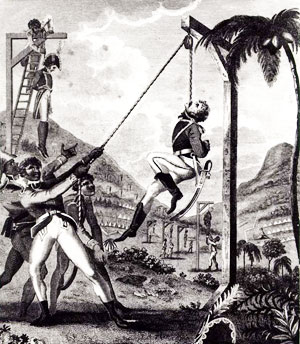 When the stocks had completely run out, the commander decided to abscond at night to Cuba
in the remaining ships with the soldiers. As this withdrawal was to remain at all costs
undetected by the enemy, it was decided to sacrifice the 140 Poles who were stationed in
the citadel and 40 French who were defending a river crossing in front of the city.
Infamously, the Polish officers were also informed of the plan, and these officers used
the opportunity to make off secretly with the French, leaving their men to their fates.
The British intercepted the greater part of the ships and brought the prisoners to
Jamaica, but three ships with 250 men managed to reach Cuba. There the commanding general
and the other officers became primarily concerned with writing their memoirs to justify
their "heroic" deeds while blaming each other. Meanwhile, when the rebels
entered Jérémie on the next day, the Poles in the citadel were allowed to
surrender honourably. The rebel general Ferrou related to them in detail the treachery of
their superiors, showed them the mutilated bodies of the 40 Frenchmen and said: "So
do we punish the faithless invaders, but we make an exception for those who were forced
to fight us against their will."
When the stocks had completely run out, the commander decided to abscond at night to Cuba
in the remaining ships with the soldiers. As this withdrawal was to remain at all costs
undetected by the enemy, it was decided to sacrifice the 140 Poles who were stationed in
the citadel and 40 French who were defending a river crossing in front of the city.
Infamously, the Polish officers were also informed of the plan, and these officers used
the opportunity to make off secretly with the French, leaving their men to their fates.
The British intercepted the greater part of the ships and brought the prisoners to
Jamaica, but three ships with 250 men managed to reach Cuba. There the commanding general
and the other officers became primarily concerned with writing their memoirs to justify
their "heroic" deeds while blaming each other. Meanwhile, when the rebels
entered Jérémie on the next day, the Poles in the citadel were allowed to
surrender honourably. The rebel general Ferrou related to them in detail the treachery of
their superiors, showed them the mutilated bodies of the 40 Frenchmen and said: "So
do we punish the faithless invaders, but we make an exception for those who were forced
to fight us against their will."
This demonstrated once again that the rebels considered the mercenaries as something similar to white slaves. Already at the siege of Jérémie Polish and German deserters in the army of Rebel General Ferrou were talked about. There were many rumors about Polish deserters fighting for Dessalines, most probably greatly exaggerated, but it was not unusual for prisoners to take that route in order to save their own lives. Without doubt there were some genuine defectors who were sick of receiving only empty promises instead of pay while watching their officers enrich themselves at their expense. Rumours even circulated that Dessalines himself kept a bodyguard of 30 Poles. In any case, foreign deserters were appreciated by the rebels since they could serve well primarily as artillerymen, as instructors, and also repairing weapons. German and Swiss mercenaries are mentioned here as well but the Poles apparently enjoyed special esteem. In the opinion of Dessalines they were "the white niggers of Europe". That this pont of view was not entirely wrong is illustrated by another event. Of the prisoners which the British kept in Jamaica a British captain bought 120 men for $74 per head and sold them later to the British army as soldiers for a sizeable profit.
After the fall of Jérémie the rebels started laying siege to Les Cayes. When food ran out there the French commander negotiated with the British. To save their own skins the French abandoned the mulattoes and the sick to the vengeance of the victors, who massacred thousands. At this the British and their prisoners, who watched the bloody carnage safely from aboard the ships, felt a little guilty. Many refugees who tried to reach the ships were slaughtered in the water directly in front of them. This also provided material for the justification documents and memoirs which the officers for the French would write later in the prisoner camps. In Port-au-Prince a large part of the garrison were successful in secretly escaping by night to Cuba. Futhermore they negotiated with Dessalines long enough for him to promise to spare the civilian population. He contented himself with hanging 82 whites. About a month later the last two French bases in Haiti - Le Cap Francais and Môle-Saint-Nicolas - fell in the north. The garrison from Môle-Saint-Nicolas managed to slip through the British blockade and escaped to Cuba, while that from Le Cap Francais fell into British captivity.
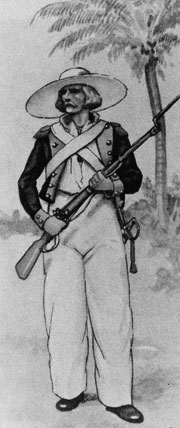 Dessalines then came to rule Haiti as Emperor Jean-Jacques I - and here too he proved how
much he had learned from the French. After his assassination two of his lieutenants ruled
simultaneously as Kings, one in the north the other in the south. Of course, the sugar
plantations were cultivated again, but since there was officially no more slavery it was
done by enforced labour. All whites except the Poles and Germans had to leave Haiti.
About 400 Poles remained and married. Not so far from Port-au-Prince in the region of
Cazale there are still today some Haitians who refer to their Polish ancestry.
Dessalines then came to rule Haiti as Emperor Jean-Jacques I - and here too he proved how
much he had learned from the French. After his assassination two of his lieutenants ruled
simultaneously as Kings, one in the north the other in the south. Of course, the sugar
plantations were cultivated again, but since there was officially no more slavery it was
done by enforced labour. All whites except the Poles and Germans had to leave Haiti.
About 400 Poles remained and married. Not so far from Port-au-Prince in the region of
Cazale there are still today some Haitians who refer to their Polish ancestry.
For the prisoners in Jamaica - about 7,000 men, one-seventh of whom were Poles - the war was not yet over. Here again the significant differences in the treatment of officers and that of rank and file men were observed. All officers who had money were allowed to emigrate to the U.S. after they had signed a covenant not to serve against Great Britain again. The others had a pass giving them freedom of movement on the island and even received some pay, which was at the time normal for officers.
The common soldiers, however, were regarded as material to be used in the best way posible. They were jailed in old, overcrowded prison hulks, guarded by sharks. Below decks they endured terrible heat and bestial stench. For food they received only waste because that way the officers responsible made more profit. Since the English had a constant need for foreigners to fill their own regiments, their main intention was to recruit especially the foreign nationals who had served the French. An officer neatly summed up this pragmatic attitude: "You served the French, shed your blood and died for them. Now you must serve England, but we will dress you better, pay you better and treat you better".
When the Poles declined the first offer their meager rations were further reduced. When this didn't bear enough fruit the British claimed to have uncovered a "conspiracy". In the following interogations the prisoners were subjected to such ferocious beatings that most signed up. Finally about 500 Polish, German and Swiss enlisted in the 60th Regiment. Eight years later when the Poles in that regiment encountered their countrymen in Spain, it is said that 150 of them went over to the French.
But Napoleon was far from grateful. When the first Polish officers returned via the U.S. to France in 1803, they expected new appointments, their outstanding wages, and in cases of invalidity maybe even a small pension. They got absolutely nothing. Napoleon was even so annoyed by their petitions he had them put on half pay and transfered to a remote garrison in Châlons-sur-Marne. There they lived quite miserably since their pay was barely sufficient to allow them to leave the barracks and they were forced to wait for better times. They didn't have to wait long; in 1805 the War of the Third Coalition broke out, followed by the campaigns in Spain and Russia. Everywhere there was use for the loyal Poles, eager to die for an emperor who couldn't have cared less about them.